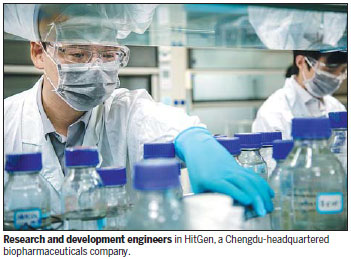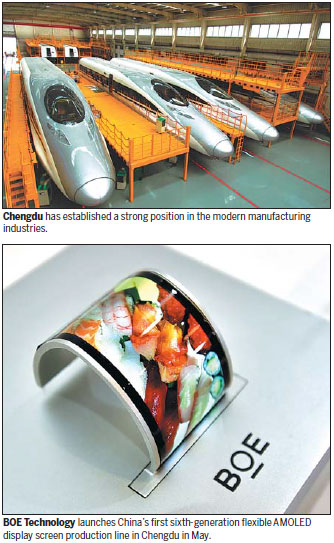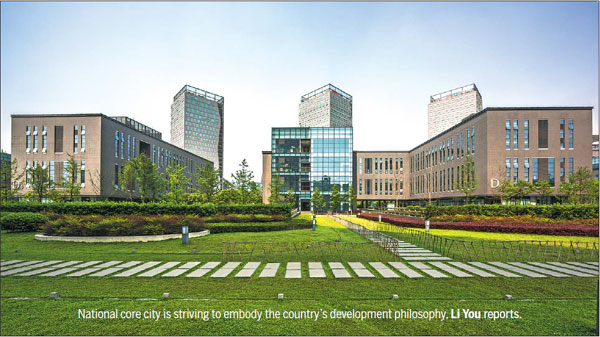Chengdu to boost Belt and Road, opening-up in western China
National core city is striving to embody the country's development philosophy, Li You reports.
Sichuan province's capital will attract more industrial development opportunities - amid China's continued efforts to promote the Belt and Road Initiative and opening-up policies in the country's western regions.
Chengdu said it will strengthen the innovation of its supply support services and to foster healthy industrial development ecosystems. It also plans to take measures to build up industries that can help to enhance its international competitiveness and power to support regional development, after holding the National Core City Industrial Development Conference and releasing the 50 new industrial supportive policies in July.

The city has long been regarded as one of the most competitive cities in western China. Its GDP reached 1.22 trillion yuan ($183.11 billion) in 2016, for a year-on-year increase of 7.7 percent.
The city has five pillar industries - electronic information, automotive manufacturing, food and beverage, equipment manufacturing and bio-pharmacy.
Chengdu has set itself a goal of becoming a national core city that can demonstrate China's new development philosophy - embracing innovation, coordination, sustainable development, openness and shared development.
One example of that is a town focusing on developing bio-industry in the southwest of Chengdu - Chengdu Tianfu International Bio-town. In July it signed strategic agreements with Sino-US Business Innovation Center (Boston) and Curelong, a unit of United States-based Cureport.
The agreement involved the launch of Curechuan Chengdu Pharmaceutical. Curelong will invest at least 1.3 billion yuan to establish an international nanobiomedical industry base.

The first phase of the project is expected take up 13.33 hectares. It will be a nanobiomedical technology development, incubation, cooperation and commercialization center upon completion.
The project will create 840 job positions, 300 of which will be for technology developers.
The operators of Chengdu Tianfu International Bio-town are also keen to learn more about advanced technology and talent management skills from international companies.
Representatives from the bio-town have visited Harvard University, Cambridge University and international biomedical companies including Cureport and 1Globe Holdings.
"Chengdu and Boston share some similarities in terms of their advantages in science development and education," said Li Xinwei, chairman of Chengdu Tianfu International Bio-town Investment and Development.
Li said that Boston has gathered global leading pharmaceutical companies, a biological technology company and first-class talent, while Chengdu has leading research institutes based at Sichuan University, University of Electronic Science and Technology of China.
"With the promotion of international cooperation and the deepening of cooperation between schools and enterprises, it is expected that more internationally renowned enterprises and talent will settle down in the bio-town," Li said.
The bio-town is taking measures to attract more projects and high-caliber staff. So far, 62 projects, with a total agreed investment of 78.8 billion yuan, will settle in the town, according to the local authorities.
Apart from the biomedical industry, Chengdu has always attached great importance to the electronic information industry.
The electronic information sector is expected to provide the first industrial cluster in Chengdu, with over 100 billion yuan of annual income by 2020, according to the city's latest development plan.
At present, Chengdu has become a key base for the electronic information industry in China. Global IT giants including Intel, Texas Instruments, Dell, Siemens and Foxconn have launched branches in the city.
Global Foundries, one of the world's leading wafer fabrication companies, launched its Chengdu 12-inch (305-mm) wafer fabrication project in Chengdu High-Tech Industrial Development Zone and is expected to to become operational in 2018.
Once finished, it will be the 11th production facility for the company in the world, as well as the largest and most advanced one in China, according to Sanjay Jha, CEO of Global Foundries.
China's first sixth-generation flexible AMOLED display screen production line, built by domestic leading screen maker BOE Technology, went into operation in Chengdu in May.
Contact the writer at liyou@chinadaily.com.cn
|
SIchuan province's capital will attract more industrial development opportunities amid China's continued efforts to promote the Belt and Road Initiative and the opening-up policies in the western regions.Photos Provided To China Daily |
(China Daily 09/13/2017 page5)















